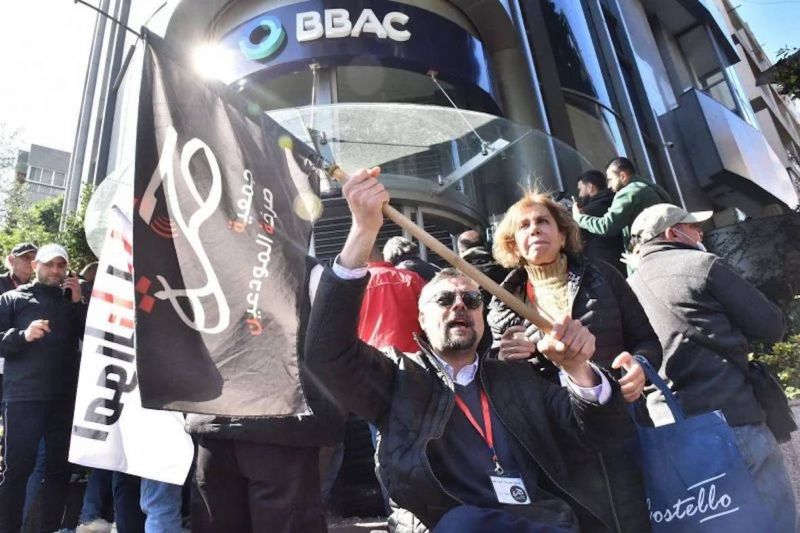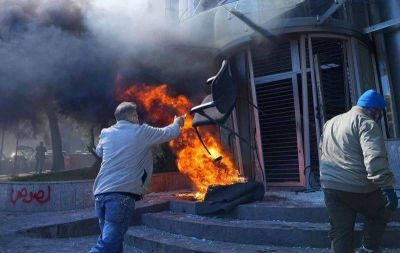
Members of depositors’ rights groups protesting outside a Beirut bank, 16 February. (Credit: Mohammad Yassine)
The letter that caretaker Prime minister Najib Mikati sent to the caretaker Interior Minister Bassam Mawlawi Tuesday, instructing him to “take the appropriate measures” in relation to the tug of war between the banks and Mount Lebanon Public Prosecutor Judge Ghada Aoun has provoked harsh criticism within judicial circles.
Lebanon’s judiciary deems this unprecedented and surprising decision by a representative of the executive branch, which resulted in Mawlawi prohibiting security forces from acting on the prosecutor’s orders, as a blatant violation of the principle of separation of powers, the basis of democracy.
Judges said they are “flabbergasted” at the approach of Mikati, who is considered close to the banks. By the same token they acknowledged that judge Aoun’s actions over the past two years have themselves been controversial, including her ignoring the decision of her superior, Lebanon’s public prosecutor Ghassan Oueidat, to ban her from cases related to financial crimes.
The Higher Judicial Council, in particular, yesterday rejected Mikati’s and Mawlawi’s decisions in the strongest terms. “We call on the prime minister and the interior minister to reverse their decisions, which undermine the principles of separation of powers and independence of judiciary,” the HJC said in a statement following its meeting.
Media reports said the HJC meeting was held without quorum. A judicial source told L’Orient-Le Jour that this was a misunderstanding, stemming from some of its members attending in person, while others attended remotely.
Speaking to L’Orient-Le Jour, judge Aoun said she is determined to carry on with her investigation. “My decisions can be enforced by civil judicial officers,” she said.
‘Middle Ages’
The Lebanese Judges Association issued a strongly-worded statement against the two officials Tuesday. “The prime minister and interior minister have reminded the Lebanese people that they and the country’s political class are living in the Middle Ages, where no law is above the will of the ‘masters’,” the statement said.
“It is not up to them to assess the actions of judge Aoun and subsequent judicial actions, because judicial bodies have competence in this regard,” it added. “This blatant interference constitutes a major sin and sets a dangerous precedent that contradicts the most basic legal principles,” it said, calling for the “immediate withdrawal” of the decisions in question.
Haytham Ezzo, a lawyer and coordinator at the Pioneers of Justice activist group, one of those that filed the complaints that are the basis of judge Aoun’s investigations, told L’Orient-Le Jour that his group will next week file “a criminal complaint [against the caretaker prime minister] with the Public Prosecutor at the Court of Cassation, based on Article 371 of the Lebanese Criminal Code, which stipulates that any official who has directly or indirectly used his authority or influence to obstruct the enforcement of a court decision shall be sanctioned.”
The same group also intends to submit a complaint with the State Shura Council to invalidate Mikati’s decision.
In the same vein, the Court of Cassation’s former public prosecutor, Hatem Madi, said that judge Aoun has the authority to continue her investigation. “The judicial police fall within the jurisdiction of the Cassation’s public prosecutor, not the interior minister,” he said, adding that “the latter is [commands] the administrative police, competent in cases of administrative offenses, such as violations of construction rules.”
“Judge Aoun’s action is a judicial, not an administrative matter, which means that the interior minister is unable to prohibit the security forces from enforcing her decisions,” said Madi.
‘Remedies for judicial authorities’ failures’
Speaking to L’Orient-Le Jour, Nicolas Nahas, former minister and adviser to the caretaker prime minister, explained the context in which the decision was taken. “Ghada Aoun is refusing to be notified of the dismissal requests filed against her by the Association of Banks in Lebanon (ABL) and several banks. She is also ignoring the lawsuits over serious faults brought against her by the same parties. The moment these [dismissal] requests and lawsuits arrive at the clerk’s office of the Court of Cassation’s general assembly, she will automatically be removed from these cases.”
“By continuing her action, judge Aoun is exceeding her powers,” argued Nahas, who said “these blatant violations of the Code of Civil Procedure prompted the prime minister to prevent any possible undermining of the banking sector ... The prime minister has not interfered in the judiciary, since it is a matter of national interest.”
Speaking to L’Orient-Le Jour, Akram Azouri, lawyer for the ABL, said that the interior minister did not breach the principle of separation of powers. “He addressed the police, not the judiciary,” he said.
“The judicial authorities, namely the justice minister, the HJC, the Judicial Inspection Board and the Court of Cassation’s public prosecutor, did not find a solution. It was therefore necessary for the executive branch to take such decisions,” said Sakhr Hachem, lawyer for Bank Audi.
He warned against “the danger that corresponding banks stop dealing with Lebanese banks, while they should not go bankrupt.”
“Ghada Aoun’s behavior risks destroying the country,” he added, denouncing the prosecutor’s “charges of money laundering, while the banks’ funds come from the Central Bank.”
This story originally ran in French in L’Orient-Le Jour, translated by Joelle Khoury
